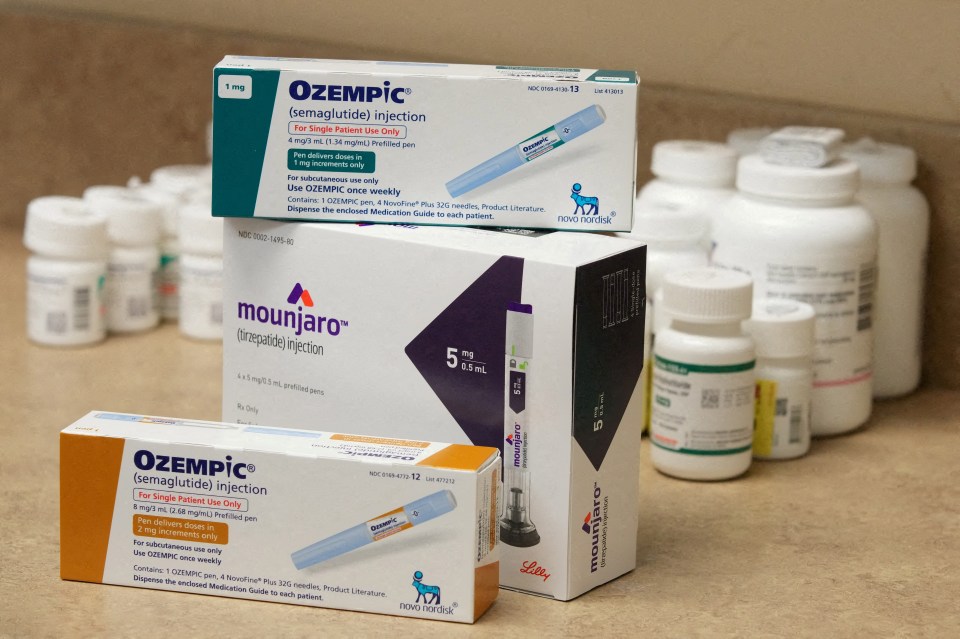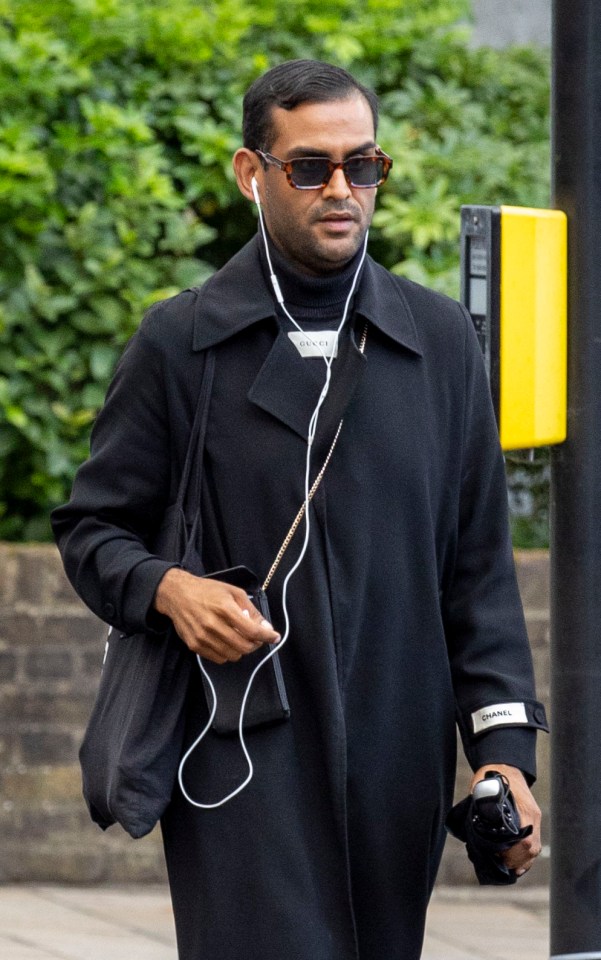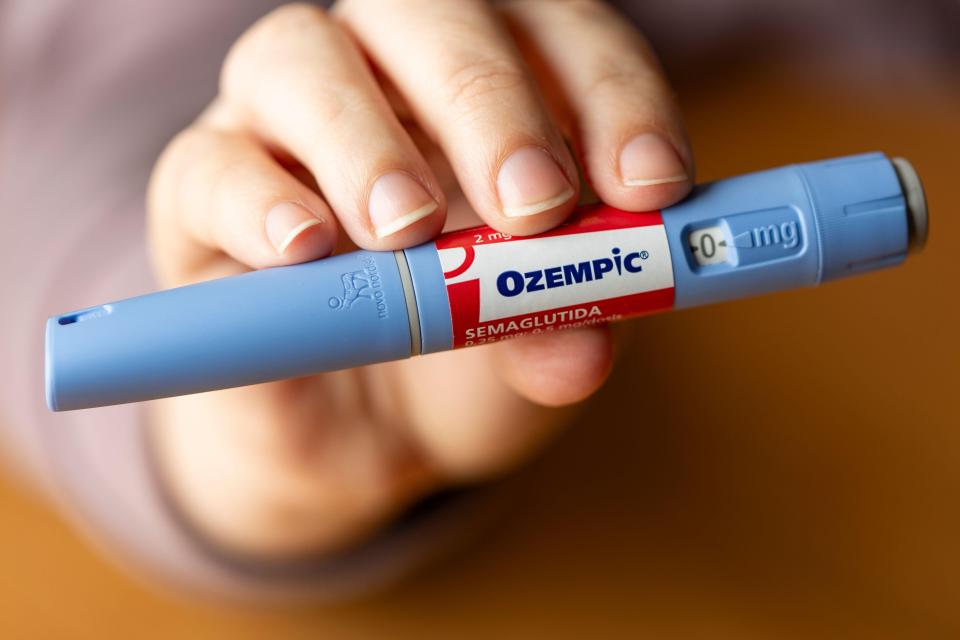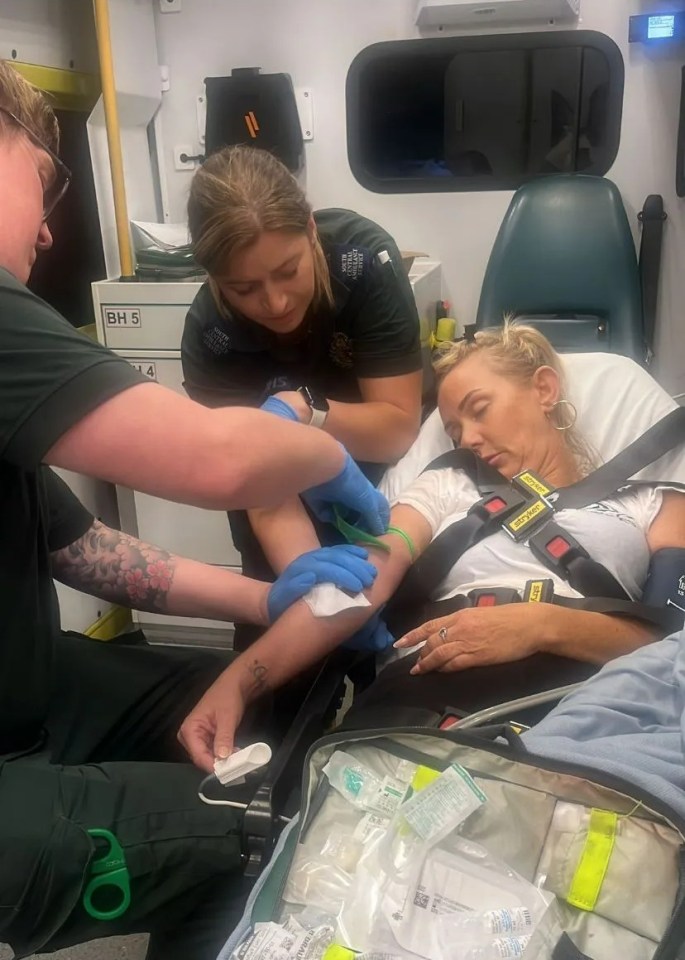CREEPING through the pharmacy, the man glanced over his shoulder to make sure the coast was clear, then flung open the fridge.
Illuminated in its fluorescent glow, he rifled through the shelves, bundling dozens of weight-loss injections into his bag before slamming it shut and scarpering back through the darkness.
It sounds like the scene of a movie – but this was no film, and this man was no burglar. Instead, he was a pharmacist, robbing his own workplace to sell the jabs on the black market.
And he’s not alone.
An exclusive investigation by The Sun can reveal a horrifying rise in chemists stealing supplies as jab demands reach an all-time high – with desperate Brits prepared to do anything to get their hands on them.
More than 1.5 million people in Britain are now on weight-loss wonder drugs, with most users reliant on pricey private prescriptions.
But with Mounjaro maker Eli Lilly almost doubling the price from £133 to £250 a shot, fears are growing that more Brits will turn to dodgy dealers – with crime gangs eager to exploit rogue pharmacy supply lines.
Caught red-handed
Several chemists and pharmacy workers have already been caught red-handed, including Akshay Sennik, who stole supplies of Ozempic from his dispensary’s stock room.
Sennik, 30, took the jabs from New Cross Pharmacy in South East London between September 2023 and March 2024.
He then sold off the once-a-week injections to back-street clients – pocketing cash from the illegal side hustle.
The pharmaceutical technician and aspiring influencer was busted when colleagues noticed “shrinkage” in the pharmacy’s stockpile of the drug.
He was sentenced to a two-year conditional discharge by Bromley magistrates after they heard his offending was motivated by alcoholism.
Likewise, Kurt Day, 38, stole 40 boxes of Mounjaro from his pharmacy in Harrogate, North Yorkshire.
He also stole 60 boxes of high-strength opioid painkillers as part of his £4,285 theft.
Day, of Sheffield, South Yorkshire, was spared jail after persuading magistrates that the drugs were “purely for personal use”.
Handing down a suspended jail sentence, JPs told him: “What you did was a breach of a high level of trust.”
Dr Thuva Amuthalingam, of Dr Derme Skin Clinics, warned buying bogus jabs is “extremely dangerous”.
He said: “Unregulated suppliers don’t care about safety, they care about profit. The risks aren’t small.
“You don’t know what you’re injecting. It could be fake, contaminated, or stored incorrectly, making it unsafe or ineffective.
“Unregulated jabs can cause severe side effects like dehydration, pancreatitis, gallstones, dangerously low blood sugar, or kidney problems – and in worst cases, hospitalisation.
“Cutting corners by buying from illicit sources is gambling with your health.”
‘Syringe of horror’
As The Sun previously reported, celeb endorsements and gushing influencers have already encouraged many people who can’t get fat jabs prescribed by the NHS to look elsewhere.
And some Brits have found out the hard way about the perils of gambling with fake drugs – which can contain a cocktail of poison, including cement and arsenic.
One of those was Celeb Big Brother star Aisleyne Horgan-Wallace, who told us she “thought she was going to die” and even lost her eyesight after unknowingly taking fake weight-loss jabs.
She was left bedridden for three days, constantly vomiting and was unable to even walk to her en-suite toilet after injecting what she dubbed a “syringe of horror”.
Her crystal clear message to anyone thinking about buying weight-loss jabs from an unofficial source is: “Don’t.”
I can’t believe that I allowed my insecurities to almost kill me
Michelle Sword
Meanwhile Michelle Sword, 47, is another who nearly died after injecting herself with a fake Ozempic jab.
She fell into a coma after administering the medicine, which turned out to be insulin.
Michele said: “It was a lot harder to get hold of Ozempic, so I didn’t go down the conventional way of doing it.
“The beauty companies and the online aesthetic companies all seemed to have it.”
The mum-of-two managed to get hold of some without any medical checks.
But soon after injecting, she collapsed and began suffering seizures – and tests showed her blood sugar levels had plummeted and sent her into a diabetic coma.
Michelle said: “I can’t believe that I allowed my insecurities to almost kill me.”
Experts stress that Ozempic and Mounjaro are prescription-only medicines, which should only be issued after a proper consultation.
Patients are asked about their medical history, weight, and often to provide photographs to confirm accuracy.
Pharmacist Jason Murphy, of online pharmacy Chemist4U, warned: “We’re likely to see more and more people turning to unregulated sellers because the medication is cheaper.
“This is extremely unsafe as many of these sources distribute counterfeit versions of Mounjaro, which pose serious risks to your health.
“Purchasing in large amounts from unregulated sources may also violate drug laws, potentially leading to fines or criminal charges, which is why it’s important that patients only access weight loss jabs through legitimate, regulated channels.”
GP Dr Helen Wall, who regularly appears on BBC Breakfast, has seen first-hand the growing desperation of jab users.
“As soon as the news broke about the hikes, we had patients contacting us asking for Mounjaro on the NHS – but it’s not available for most people, only under very tight criteria,” she said.
“Many who were using reputable sources are now struggling, and some will inevitably turn to cheaper but less reputable suppliers. That’s obviously a huge concern.”
“The danger with unregulated suppliers is that you don’t know what’s in the medication.
Dr Helen Wall
According to Dr Wall, demand is even growing for weight-loss drugs that have not yet been approved,.
“There’s another jab coming called Retatrutide – it’s still in clinical trials and is claimed to cause up to 30% weight loss,” she said.
“Already a big black market is already developing around it, which is worrying.
“The danger with unregulated suppliers is that you don’t know what’s in the medication. You might be lucky and get the drug itself – but it could be the wrong dose.
“Or it could be laced with harmful fillers, or it might not contain the active drug at all.”
Stolen to order
Industry watchdog The General Pharmaceutical Council (GPhC) has now launched a probe into claims slimming pens, like Ozempic and Mounjaro, have been “ordered and stolen” by rogue pharmacists.
Roz Gittins, chief pharmacy officer at The General Pharmaceutical Council (GPhC), said it was investigating concerns in cases where medicines were “liable to misuse, or have high monetary value, such as those used for weight management”.
She wrote to pharmacies reminding them of their “responsibility to make sure there are appropriate arrangements for the management of medicines”, which “includes having safeguards in place to prevent diversion”.
Ms Gittins told The Sun: “We have investigated some concerns where medicines – including those used for weight management – have been stolen by pharmacy staff.
“We will continue to take action when pharmacists or pharmacy technicians are involved.
“To support pharmacies to have procedures in place to prevent theft, we have written to pharmacy owners, pharmacists and pharmacy technicians.”
Everything you need to know about fat jabs
Weight loss jabs are all the rage as studies and patient stories reveal they help people shed flab at almost unbelievable rates, as well as appearing to reduce the risk of serious diseases.
Wegovy – a modified version of type 2 diabetes drug Ozempic – and Mounjaro are the leading weight loss injections used in the UK.
Wegovy, real name semaglutide, has been used on the NHS for years while Mounjaro (tirzepatide) is a newer and more powerful addition to the market.
Mounjaro accounts for most private prescriptions for weight loss and is set to join Wegovy as an NHS staple this year.
How do they work?
The jabs work by suppressing your appetite, making you eat less so your body burns fat for energy instead and you lose weight.
They do this my mimicking a hormone called GLP-1, which signals to the brain when the stomach is full, so the drugs are officially called GLP-1 receptor agonists.
They slow down digestion and increase insulin production, lowering blood sugar, which is why they were first developed to treat type 2 diabetes in which patients’ sugar levels are too high.
Can I get them?
NHS prescriptions of weight loss drugs, mainly Wegovy and an older version called Saxenda (chemical name liraglutide), are controlled through specialist weight loss clinics.
Typically a patient will have to have a body mass index (BMI) of 30 or higher, classifying them as medically obese, and also have a weight-related health condition such as high blood pressure.
GPs generally do not prescribe the drugs for weight loss.
Private prescribers offer the jabs, most commonly Mounjaro, to anyone who is obese (BMI of 30+) or overweight (BMI 25-30) with a weight-related health risk.
Private pharmacies have been rapped for handing them out too easily and video calls or face-to-face appointments are now mandatory to check a patient is being truthful about their size and health.
Are there any risks?
Yes – side effects are common but most are relatively mild.
Around half of people taking the drug experience gut issues, including sickness, bloating, acid reflux, constipation and diarrhoea.
Dr Sarah Jarvis, GP and clinical consultant at patient.info, said: “One of the more uncommon side effects is severe acute pancreatitis, which is extremely painful and happens to one in 500 people.”
Other uncommon side effects include altered taste, kidney problems, allergic reactions, gallbladder problems and hypoglycemia.
Evidence has so far been inconclusive about whether the injections are damaging to patients’ mental health.
Figures obtained by The Sun show that, up to January 2025, 85 patient deaths in the UK were suspected to be linked to the medicines.
Britain’s advertising watchdog has also stepped in, warning pharmacies it is illegal to promote slimming jabs to the public.
UK law forbids promotion of any prescription medication, including sponsored posts on social media. Breaches can result in hefty fines or even jail.
Rogue pharmacies have also been accused by the General Pharmaceutical Council of shipping fat jabs to countries where their use is illegal.





















